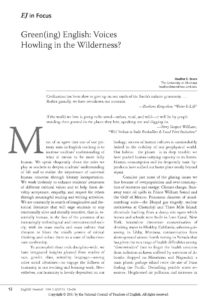Author: Heather Bruce
Summary: Noting that “in literature and language arts classes at the secondary level, where we do not hesitate to study the impact of ethical mores in human lives, where we do not hesitate to teach respect for life, we have fairly well ignored our impact on the natural world or our relationships with it,” Heather Bruce argues for teachers to engage students in considering a range of difficult issues related to climate, environment, and the future of humanity. A useful resource for launching a content-area study that brings current environmental questions into the reading and writing curriculum.
Original Date of Publication: August 5, 2011
Excerpt
Yet in literature and language arts classes at the secondary level, where we do not hesitate to study the impact of ethical mores in human lives, where we do not hesitate to teach respect for life, we have fairly well ignored our impact on the natural world or our relationships with it. If we look at the major publications of our profession, we would never suspect that “the earth’s life support systems were under stress. Indeed, [we] might never know that there was an earth at all” (Glotfelty xvi). Ecological literacy expert David W. Orr contends that “all education is environmental education” both by inclusion and exclusion (Ecological Literacy 90). By what is included or excluded, we teach students that they are “a part of or apart from” the natural world (12). The implicit environmental education, which English language arts students are receiving through exclusion, is that our ecological relationship with our habitat is either a matter of little importance or something only relevant to “science geeks.”
Related Resources
Original Source: National Writing Project, http://www.nwp.org/cs/public/print/resource/3625
